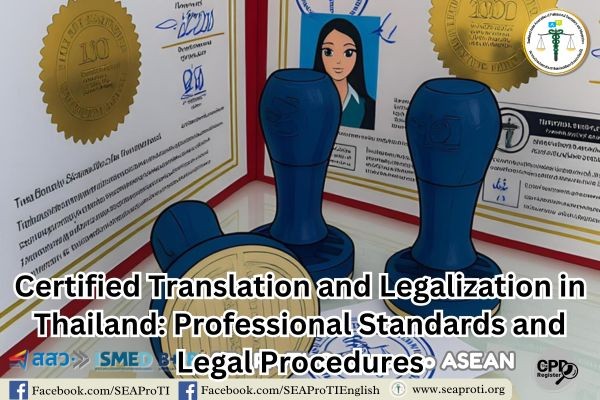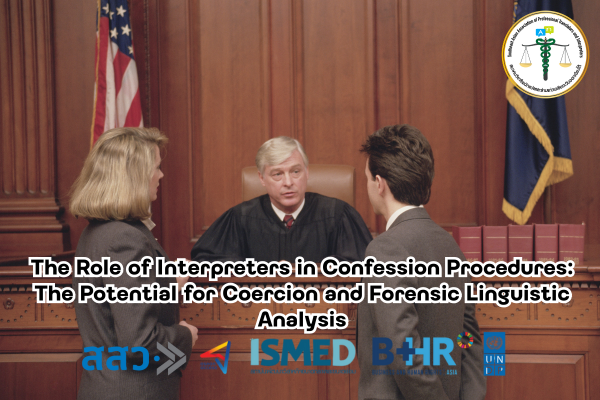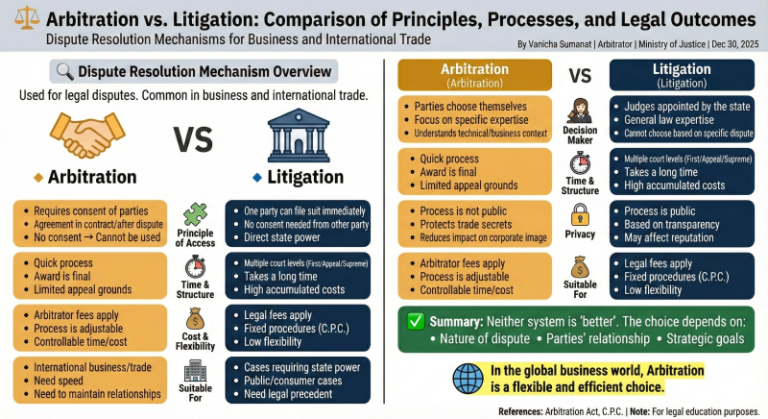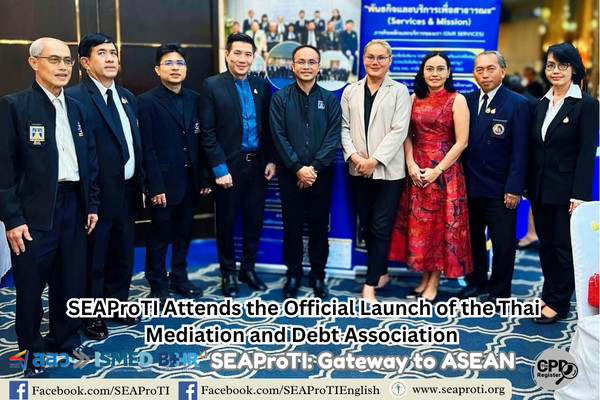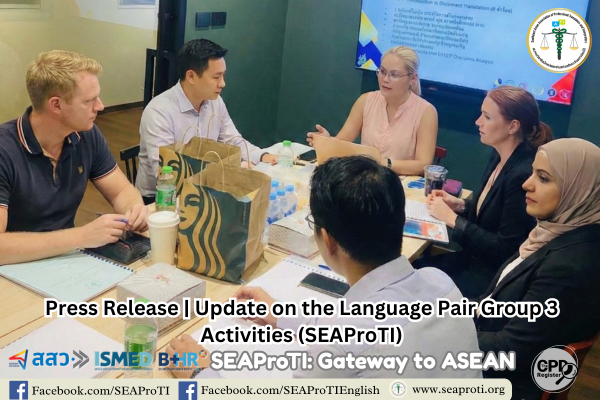Certified Translation and Legalization in Thailand: Professional Standards and Legal Procedures
18 October 2025, Bangkok – This article provides an overview of the certified translation and legalization system in Thailand, emphasizing the role of professional accreditation through the Southeast Asian Association of Professional Translators and Interpreters (SEAProTI). It highlights the procedural steps for legalization, explains the legal meaning of certification, and outlines the ethical and professional expectations for translators handling official documents intended for domestic or international use.
In Thailand, official translations of legal and administrative documents often require both certification and legalization before they can be used either domestically or abroad. While there is no centralized state licensing system for translators, official acceptance depends largely on recognized professional credentials and established practices of the Ministry of Foreign Affairs (MFA). Certified translators play a crucial role in ensuring the legal validity, accuracy, and cross-border recognition of translated documents.
Translation becomes legally necessary in various circumstances involving cross-jurisdictional communication.
- Domestic Use: Foreign-language documents submitted to Thai authorities, courts, or administrative agencies must be translated into Thai and certified to be legally admissible. Under the 1997 Ministerial Regulation on Translation and Certification of Official Documents, which implements the Administrative Procedure Act B.E. 2539 (1996), these documents must be accurately translated and certified by qualified professionals.
- Overseas Use: Thai documents intended for use abroad typically require English translation, legalization by the Ministry of Foreign Affairs (MFA), and authentication by the relevant embassy. However, based on SEAProTI’s experience in a probate case, an overseas court rejected translations prepared by a local Thai agency, even though the translator’s signature had been certified by the MFA. This demonstrates that foreign courts tend to place greater trust in certified translators rather than local translation agencies.
The Meaning of “Certified Translation”
In Thailand, the term “certified translation” is commonly misunderstood. Domestically, it often refers to a translation accompanied by a signed and stamped declaration by the translator attesting to its completeness and accuracy. However, in the professional and international context, a certified translation refers to one prepared by a certified translator—a practitioner who has undergone formal peer assessment and credentialing.
SEAProTI currently serves as the principal professional body in Thailand that conducts peer certification and licensing for translators and interpreters. SEAProTI-certified translators are authorized to certify translations within their field of specialization. Their professional license signifies adherence to established standards of linguistic accuracy, ethical conduct, and procedural reliability.
Importantly, Thailand does not issue any government translator license, and the MFA does not certify translators. The MFA’s role is limited to verifying signatures and authenticating documents, not to assessing or approving translation quality. Therefore, any claims of being “MFA-certified” or “MFA-accredited” are misleading and should be avoided.
Legalization Workflow
The legalization process for translated documents generally involves three key stages:
Notarization (if required):
Non-licensed translators often require a Notarial Services Attorney (NSA) to notarize their signature, confirming the authenticity of the translator’s declaration. However, the NSA’s role is limited to verifying the translator’s signature, not to certifying the translation itself.
MFA Legalization:
The Department of Consular Affairs verifies the authenticity of signatures and compares certified copies with original documents. The MFA neither provides translation services nor certifies translations. Translators themselves must certify the accuracy of their work prior to submission.
Embassy Authentication:
For documents intended for use in foreign jurisdictions, additional authentication may be required by the embassy or consulate of the destination country. Some Thai embassies abroad also issue country-specific translation and legalization guidelines.
Selecting a Qualified Translator
Choosing the right translator is essential to ensure that official documents meet both professional and legal requirements. The following criteria are fundamental:
Professional Certification:
Translators holding SEAProTI or equivalent certification are preferred by Thai government agencies, courts, and private institutions. Certification ensures that the translator has undergone professional evaluation and adheres to recognized standards.
Proven Track Record:
Translators with a consistent record of MFA-accepted translations demonstrate familiarity with Thailand’s legalization procedures. Nevertheless, MFA legalization does not guarantee acceptance by foreign institutions, as each jurisdiction applies its own verification criteria.
Mastery of Official Formatting Rules:
Competent translators must adhere to official conventions, including correct Romanization of Thai names and the standardized layout of official documents such as the Tabien Baan (house registration). SEAProTI-certified professionals are trained in these standards to ensure international consistency.
Accuracy for Sensitive Documents:
Inaccuracies in personal names, numerical details, or dates can lead to rejection or delays. Translators must apply rigorous attention to detail, particularly when handling sensitive materials such as police certificates or civil status records.
Practical Considerations
Consultation Before Translation:
Clients should confirm the language, formatting, and legalization requirements before commissioning a translation. Standards differ across embassies and jurisdictions. SEAProTI’s professional experience indicates that some translations produced by non-specialized agencies—even when legalized by the MFA—have been rejected abroad for failing to meet the required standards.
Planning for Legalization:
The legalization process can be time-consuming. Sufficient time should be allowed for MFA queues, embassy authentication appointments, and potential document verification.
Urgent Services:
While expedited legalization is available, it is often limited and incurs additional costs. Advance planning is therefore recommended.
Certain practices can jeopardize the acceptance of translated documents:
Misrepresentation: Claims such as “MFA-certified translator” are false and can lead to rejection. The MFA does not license translators or translation agencies.
Incomplete Legalization: Skipping notarization or embassy authentication may render the legalization process incomplete, resulting in the refusal of submission by authorities.
Conclusion
Certified translation and legalization in Thailand involve a combination of linguistic expertise, procedural compliance, and professional accountability. While no governmental licensing system exists, SEAProTI plays a pivotal role in ensuring quality and reliability through its peer certification framework. Understanding the distinction between translation certification and document legalization is essential for both translators and clients to avoid procedural errors and ensure international acceptance of official documents.
References
- Ministry of Foreign Affairs, Department of Consular Affairs. (2024). Guidelines for document legalization. Bangkok: MFA.
- Southeast Asian Association of Professional Translators and Interpreters (SEAProTI). (2025). Professional certification and credentialing framework for translators and interpreters in Thailand. Bangkok: SEAProTI Secretariat.
- Thai Bar Association. (2023). Notarial Services Attorney regulations. Bangkok: TBA.
- United Nations Economic and Social Commission for Asia and the Pacific (UNESCAP). (2023). Regional framework on cross-border document authentication and legalization. Bangkok: UNESCAP.
About Certified Translators, Translation Certifiers, and Certified Interpreters of SEAProTI
The Southeast Asian Association of Professional Translators and Interpreters (SEAProTI) has formally announced the qualifications and requirements for registration of Certified Translators, Translation Certification Providers, and Certified Interpreters in Sections 9 and 10 of the Royal Gazette, published by the Secretariat of the Cabinet, Office of the Prime Minister of Thailand, on 25 July 2024 (Vol. 141, Part 66 Ng, p. 100). Certified Translators, Translation Certification Providers, and Certified Interpreters
The Council of State has proposed the enactment of a Royal Decree, granting registered translators and recognized translation certifiers from professional associations or accredited language institutions the authority to provide legally valid translation certification (Letter to SEAProTI dated April 28, 2025)
SEAProTI is the first professional association in Thailand and Southeast Asia to implement a comprehensive certification system for translators, certifiers, and interpreters.
Head Office: Baan Ratchakru Building, No. 33, Room 402, Soi Phahonyothin 5, Phahonyothin Road, Phaya Thai District, Bangkok 10400, Thailand
Email: hello@seaproti.com | Tel.: (+66) 2-114-3128 (Office hours: Mon–Fri, 09:00–17:00)
ในประเทศไทย การแปลเอกสารราชการและเอกสารทางกฎหมายจำเป็นต้องผ่านกระบวนการ “รับรองการแปล” และ “การรับรองเอกสาร (Legalization)” ก่อนจะนำไปใช้ได้ทั้งในและต่างประเทศ แม้ประเทศไทยจะยังไม่มีระบบใบอนุญาตนักแปลที่ออกโดยรัฐ แต่การยอมรับในทางราชการขึ้นอยู่กับคุณสมบัติวิชาชีพและแนวปฏิบัติของกระทรวงการต่างประเทศ (กต.) ซึ่งนักแปลที่ได้รับการรับรองมีบทบาทสำคัญต่อความถูกต้องและความน่าเชื่อถือของเอกสารแปลในทางกฎหมาย
กรณีการใช้งานภายในประเทศ
เอกสารภาษาต่างประเทศที่ต้องยื่นต่อหน่วยงานราชการ ศาล หรือองค์กรของรัฐ ต้องได้รับการแปลเป็นภาษาไทยและรับรองความถูกต้องตามข้อบังคับกระทรวงมหาดไทย พ.ศ. 2540 อันเป็นการบังคับใช้ตามพระราชบัญญัติวิธีปฏิบัติราชการทางปกครอง พ.ศ. 2539 เพื่อให้เอกสารดังกล่าวมีผลทางกฎหมาย
กรณีการใช้งานในต่างประเทศ
เอกสารภาษาไทยที่ต้องนำไปใช้ในต่างประเทศ มักต้องผ่านขั้นตอนการแปลเป็นภาษาอังกฤษ การรับรองเอกสารโดยกระทรวงการต่างประเทศ (กต.) และการรับรองจากสถานทูตของประเทศปลายทาง อย่างไรก็ตาม จากประสบการณ์ของ SEAProTI ในคดีมรดกต่างประเทศ พบว่าศาลต่างประเทศบางแห่งปฏิเสธเอกสารแปลจากบริษัทแปลในไทย แม้ลายมือชื่อของนักแปลจะผ่านการรับรองจาก กต. แล้วก็ตาม แสดงให้เห็นว่าศาลต่างประเทศให้ความเชื่อมั่นกับ “นักแปลที่ได้รับการรับรอง (Certified Translators)” มากกว่าบริษัทแปลทั่วไป
เอกสารที่มักต้องใช้ในการแปลและรับรอง เช่น เอกสารตรวจคนเข้าเมือง สูติบัตร ทะเบียนสมรส/หย่า หนังสือรับรองบริษัท เอกสารศาล ใบรับรองความประพฤติ และเอกสารการลงทุน BOI เป็นต้น
ความหมายของ “การแปลรับรอง” (Certified Translation)
ในประเทศไทย คำว่า “การแปลรับรอง” มักถูกเข้าใจผิด โดยทั่วไปหมายถึงการที่นักแปลลงชื่อและประทับตราเพื่อรับรองว่า “แปลถูกต้องครบถ้วน”
แต่ในบริบทวิชาชีพและสากล “การแปลรับรอง” หมายถึงเอกสารที่แปลโดย “นักแปลที่ได้รับการรับรอง (Certified Translator)” ซึ่งผ่านการประเมินจากคณะผู้ทรงคุณวุฒิและได้รับใบอนุญาตอย่างเป็นทางการ
SEAProTI เป็นองค์กรหลักในประเทศไทยที่ดำเนินการรับรองวิชาชีพนักแปลและล่าม นักแปลที่ได้รับการรับรองจาก SEAProTI จะได้รับสิทธิ์ในการรับรองงานแปลของตนเองในสาขาที่ตนเชี่ยวชาญ ใบอนุญาตวิชาชีพนี้ยืนยันถึงความถูกต้องของภาษา ความซื่อสัตย์ในวิชาชีพ และความรับผิดชอบตามจรรยาบรรณ
ที่สำคัญ ประเทศไทยไม่มีระบบ “ใบอนุญาตนักแปลจากภาครัฐ” และกระทรวงการต่างประเทศ (กต.) ไม่ได้เป็นผู้รับรองคุณภาพการแปล แต่เพียงตรวจสอบลายมือชื่อและความถูกต้องของเอกสารเท่านั้น ดังนั้น คำกล่าวอ้างเช่น “นักแปลที่ได้รับการรับรองจาก กต.” หรือ “บริษัทแปลที่ กต. รับรอง” เป็นข้อมูลที่ไม่ถูกต้องและอาจทำให้เอกสารถูกปฏิเสธได้
ขั้นตอนการรับรองเอกสาร (Legalization Workflow)
การรับรองโดยทนายความโนตารี (Notarial Services Attorney – NSA)
สำหรับนักแปลที่ไม่ได้รับใบอนุญาตวิชาชีพ มักต้องให้ทนายความโนตารีลงนามรับรองลายมือชื่อ เพื่อยืนยันว่าเป็นผู้ลงชื่อจริง แต่ทนายไม่ได้รับรอง “คุณภาพของการแปล” แต่อย่างใด
การรับรองโดยกระทรวงการต่างประเทศ (MFA Legalization)
กรมการกงสุลตรวจสอบลายมือชื่อและเปรียบเทียบเอกสารกับต้นฉบับ โดย กต. ไม่ได้ให้บริการแปลหรือรับรองคุณภาพการแปล นักแปลจะต้องรับรองความถูกต้องด้วยตนเองก่อนยื่นขอ
การรับรองจากสถานทูตปลายทาง (Embassy Authentication)
เอกสารที่ต้องใช้ในต่างประเทศอาจต้องผ่านการรับรองจากสถานทูตของประเทศนั้นเพิ่มเติม บางประเทศมีแนวปฏิบัติหรือรูปแบบการแปลเฉพาะที่ต้องปฏิบัติตาม
การเลือกนักแปลที่มีคุณสมบัติเหมาะสม
คุณวุฒิวิชาชีพ (Professional Certification):
นักแปลที่ได้รับการรับรองจาก SEAProTI หรือองค์กรที่เทียบเท่า มักเป็นที่ยอมรับจากหน่วยงานรัฐ ศาล และองค์กรเอกชนในไทย เพราะผ่านการประเมินความสามารถตามมาตรฐานสากล
ผลงานที่ได้รับการยอมรับ (Proven Track Record):
นักแปลที่มีประวัติการแปลที่ผ่านการรับรองจาก กต. อย่างต่อเนื่อง แสดงถึงความชำนาญในขั้นตอนการรับรองเอกสาร แม้กระนั้น การรับรองจาก กต. ก็ไม่รับประกันว่าศาลหรือหน่วยงานต่างประเทศจะยอมรับโดยอัตโนมัติ
ความรู้ด้านรูปแบบเอกสารราชการ (Official Formatting Rules):
นักแปลมืออาชีพต้องเข้าใจหลักการโรมันชื่อไทย การจัดบรรทัด และโครงสร้างเอกสาร เช่น ทะเบียนบ้าน หรือใบทะเบียนบริษัท เพื่อให้ถูกต้องตามรูปแบบราชการและเป็นที่ยอมรับในต่างประเทศ
ความแม่นยำของข้อมูลสำคัญ (Accuracy):
ข้อผิดพลาดเพียงเล็กน้อยในชื่อ เลขที่ หรือวันที่ อาจทำให้เอกสารถูกปฏิเสธได้ โดยเฉพาะในเอกสารสำคัญ เช่น ใบรับรองความประพฤติหรือสูติบัตร
ข้อควรคำนึงในการดำเนินการ
การปรึกษาก่อนการแปล:
ผู้ว่าจ้างควรสอบถามรายละเอียดด้านภาษา รูปแบบ และขั้นตอนการรับรองกับนักแปลที่ได้รับการรับรองล่วงหน้า เนื่องจากข้อกำหนดอาจแตกต่างกันในแต่ละประเทศ
การวางแผนเวลา:
ขั้นตอนการรับรองอาจใช้เวลานาน โดยเฉพาะในช่วงที่คิวรับรองของ กต. หรือสถานทูตหนาแน่น ควรวางแผนล่วงหน้าเสมอ
บริการเร่งด่วน:
แม้จะมีบริการเร่งด่วน แต่จำนวนจำกัดและมีค่าใช้จ่ายสูงกว่าปกติ จึงควรเตรียมการล่วงหน้าเพื่อลดค่าใช้จ่ายและความเสี่ยง
ความเข้าใจผิดและความเสี่ยงที่พบบ่อย
การอ้างอิงที่คลาดเคลื่อน:
คำว่า “นักแปลที่ได้รับการรับรองจาก กต.” เป็นคำอ้างที่ไม่ถูกต้องและอาจทำให้เอกสารถูกปฏิเสธ
การข้ามขั้นตอน:
หากไม่ผ่านการรับรองจากทนายความหรือสถานทูตตามที่กฎหมายกำหนด เอกสารอาจไม่สามารถยื่นต่อหน่วยงานปลายทางได้
บทสรุป
การแปลรับรองและการรับรองเอกสารในประเทศไทยต้องอาศัยทั้ง “ความเชี่ยวชาญทางภาษา” และ “การปฏิบัติตามขั้นตอนทางกฎหมายอย่างเคร่งครัด” แม้จะไม่มีระบบใบอนุญาตนักแปลของรัฐ แต่ SEAProTI มีบทบาทสำคัญในการยกระดับมาตรฐานและความน่าเชื่อถือของวิชาชีพ ผ่านระบบการรับรองโดยเพื่อนร่วมวิชาชีพ (Peer Certification) ซึ่งเป็นกลไกหลักในการสร้างความไว้วางใจและความยอมรับในระดับสากล
การเข้าใจความแตกต่างระหว่าง “การรับรองการแปล (Certification)” กับ “การรับรองเอกสาร (Legalization)” จึงเป็นสิ่งสำคัญทั้งสำหรับนักแปลและผู้ใช้บริการ เพื่อหลีกเลี่ยงข้อผิดพลาดทางขั้นตอน และให้เอกสารแปลของไทยได้รับการยอมรับทั่วโลก
เอกสารอ้างอิง
- กระทรวงการต่างประเทศ กรมการกงสุล. (2567). แนวทางการรับรองเอกสารราชการ. กรุงเทพฯ: กต.
- สมาคมนักแปลและล่ามอาชีพแห่งเอเชียตะวันออกเฉียงใต้ (SEAProTI). (2568). กรอบการรับรองวิชาชีพนักแปลและล่ามในประเทศไทย. กรุงเทพฯ: สำนักเลขาธิการสมาคม.
- สภาทนายความ. (2566). ข้อบังคับว่าด้วยทนายความโนตารี (Notarial Services Attorney). กรุงเทพฯ: สภาทนายความ.
- คณะกรรมาธิการเศรษฐกิจและสังคมแห่งสหประชาชาติประจำเอเชียและแปซิฟิก (UNESCAP). (2566). กรอบความร่วมมือระดับภูมิภาคว่าด้วยการรับรองเอกสารข้ามพรมแดน. กรุงเทพฯ: UNESCAP.
สมาคมวิชาชีพนักแปลและล่ามแห่งเอเชียตะวันออกเฉียงใต้ (SEAProTI) ได้ประกาศหลักเกณฑ์และคุณสมบัติผู้ที่ขึ้นทะเบียนเป็น “นักแปลรับรอง (Certified Translators) และผู้รับรองการแปล (Translation Certification Providers) และล่ามรับรอง (Certified Interpreters)” ของสมาคม หมวดที่ 9 และหมวดที่ 10 ในราชกิจจานุเบกษา ของสำนักเลขาธิการคณะรัฐมนตรี ในสำนักนายกรัฐมนตรี แห่งราชอาณาจักรไทย ลงวันที่ 25 ก.ค. 2567 เล่มที่ 141 ตอนที่ 66 ง หน้า 100 อ่านฉบับเต็มได้ที่: นักแปลรับรอง ผู้รับรองการแปล และล่ามรับรอง
สำนักคณะกรรมการกฤษฎีกาเสนอให้ตราเป็นพระราชกฤษฎีกา โดยกำหนดให้นักแปลที่ขึ้นทะเบียน รวมถึงผู้รับรองการแปลจากสมาคมวิชาชีพหรือสถาบันสอนภาษาที่มีการอบรมและขึ้นทะเบียน สามารถรับรองคำแปลได้ (จดหมายถึงสมาคม SEAProTI ลงวันที่ 28 เม.ย. 2568)
สมาคมวิชาชีพนักแปลและล่ามแห่งเอเชียตะวันออกเฉียงใต้ เป็นสมาคมวิชาชีพแห่งแรกในประเทศไทยและภูมิภาคเอเชียตะวันออกเฉียงใต้ที่มีระบบรับรองนักแปลรับรอง ผู้รับรองการแปล และล่ามรับรอง
สำนักงานใหญ่: อาคารบ้านราชครู เลขที่ 33 ห้อง 402 ซอยพหลโยธิน 5 ถนนพหลโยธิน แขวงพญาไท เขตพญาไท กรุงเทพมหานคร 10400 ประเทศไทย
อีเมล: hello@seaproti.com โทรศัพท์: (+66) 2-114-3128 (เวลาทำการ: วันจันทร์–วันศุกร์ เวลา 09.00–17.00 น.)


